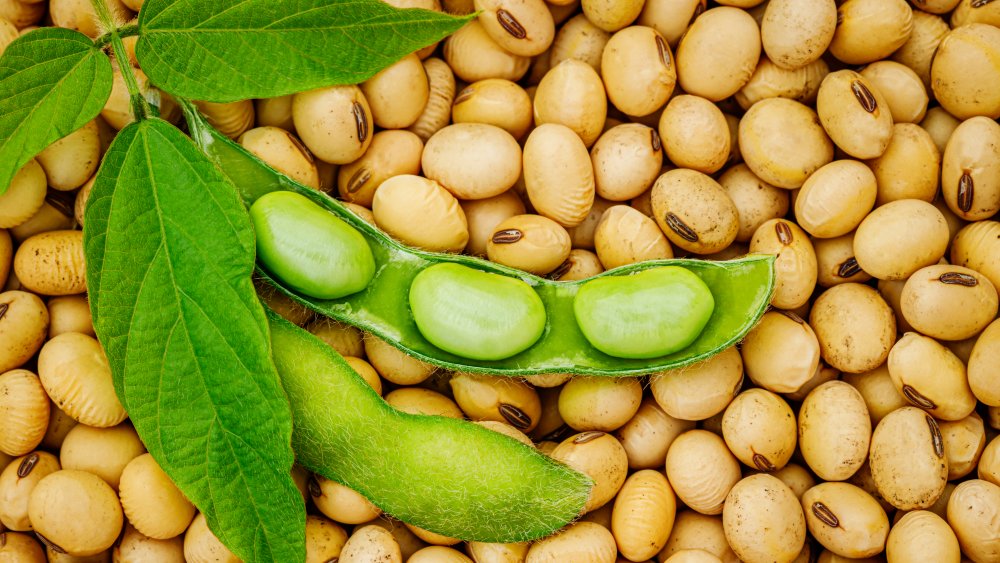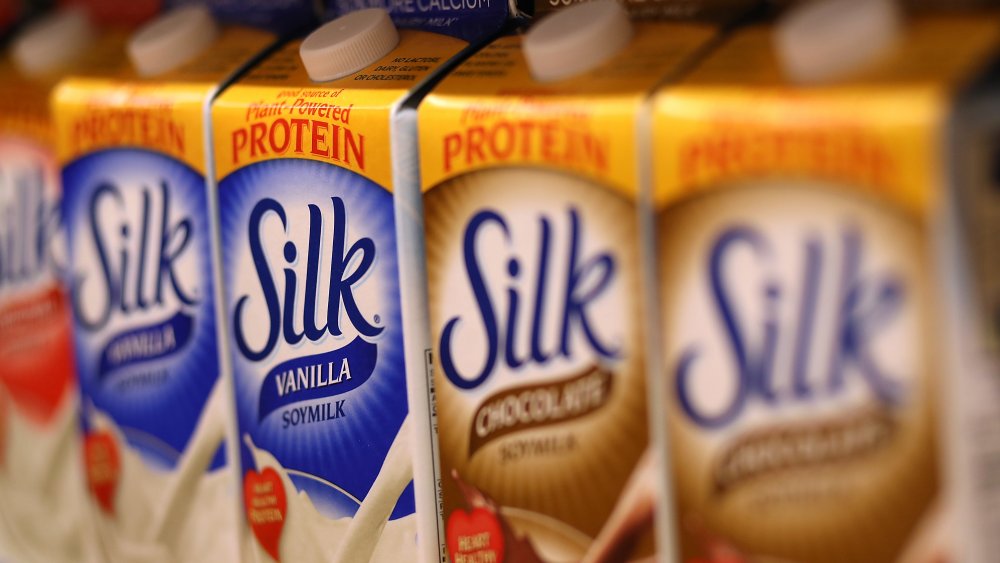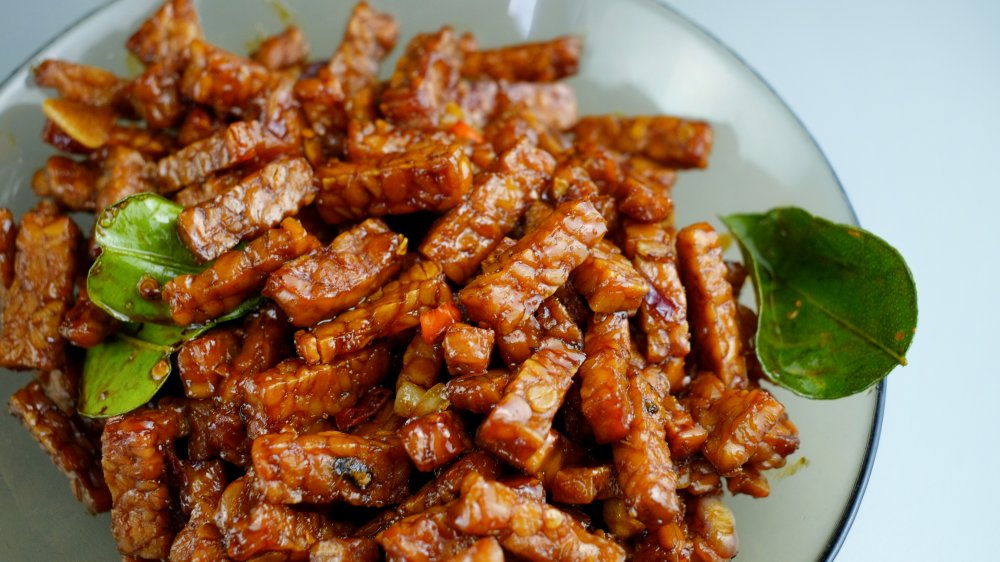Myths About Soy You Can Stop Believing
Back in the 2000s, you may have heard that consuming tofu can diminish your memory or even "shrink your brain" (via Drew Ramsey MD). Of course, if that myth were true, maybe you wouldn't remember hearing about it because you ate too much tofu.
If young girls eat soy, as another myth has it, puberty will come earlier. This myth came out of a scientific study involving rats who received doses of compounds found in soy that mimic estrogen (via Science Daily). The estrogen-like isoflavones have also been said to cause breast cancer (via Live Science). Then there was the guy who drank three quarts of soy milk a day and developed breasts (via Men's Health). Loyal readers of Men's Health no doubt dumped their soy protein powder down the fitness-club drain after reading that. The Men's Health article also warned parents about soy-based baby formulas. Research showed those isoflavones at it again, this time interfering with the immune systems in mice.
Soy might have the worst reputation on this side of bacon. On the other hand, tofu, which is made from soy, is on a shortlist of plant-based sources of complete proteins (via Healthline). Soy has also been consistently linked with a reduced risk of heart disease (via Science Daily). So, should we eat soy or not? It's time we separated myth from fact.
Soy doesn't impair brain functions
Let's try to calm fears of brain shrinkage. The big study that linked tofu to shrinking brains may have fallen into the "correlation is not causation" trap (via Drew Ramsey MD). Since tofu is so often used as a meat substitute, people who eat it regularly may not be getting a lot of seafood in their diets. The two nutrients that do the most to stave off brain atrophy are vitamin B12 and DHA, an omega-3 fatty acid. Fish and shellfish have a lot of B12 and DHA — tofu, not so much. People in Japan eat a lot of tofu and a lot of seafood, and they are known for longevity and good health. For them, tofu is clearly not a problem.
Scientists pursued the soy-brain connection more rigorously after the 2000 study (via the Soy Nutrition Institute). If anything, they found that soy actually improved cognitive function, although the evidence was weak. But the takeaway here is that the studies found no evidence that people become mentally impaired from eating soy.
Soy doesn't make puberty start early and is OK in baby formula
The belief that soy causes early puberty is a myth, although the myth is based on science. A study published in 2008 involved feeding newborn rats genistein and equol, two estrogen-like compounds that come from soy. The study concluded that the compounds changed rats' brains in a way that led to early puberty (via Science Daily). What does this mean for human girls? Nothing, it turns out. Studies that followed growing girls showed those who ate more soy actually went into puberty later, or else they showed no difference in puberty (via Psychology Today). The original study may have been skewed because researchers fed rats straight plant estrogens. Scientists could not trigger early puberty in rats by feeding them whole soy, according to Psychology Today.
Yet another scientific study appeared to put the dagger in soy-based baby formulas. The study showed that mice injected with our old friend genistein had severely compromised immune systems (via Scientific American). But again, these outcomes aren't being seen in people. Healthline assures us that soy-based formula does not harm a baby's immune system or sexual development, maybe because animals metabolize soy isoflavones differently. In fact, Healthline says that soy infant formula is a healthy option for vegan families and babies who can't digest dairy properly.
Soy doesn't give women breast cancer -- or give men breasts
Estrogen-like compounds have also led to the myth that soy products increase the risk of breast cancer (via Today's Dietician). Research in this particular area has been complicated, even paradoxical, but scientists think they are homing in on an explanation for this myth (via Live Science). The paradox is based on soy's reputation as both a supposed contributor to breast cancer and a cancer-fighting food. Recent studies – again with the rats – showed that isoflavones did help prevent cancer, but if the rats weren't fed them until after they developed cancer, then the disease worsened. More research is needed to determine whether the results for rats apply to women, but this study indicates eating soy throughout life is a good way to prevent cancer.
A particularly troubling myth about soy, at least among men who covet their masculinity, is that it causes men to develop female characteristics, including breasts. A vast majority of the science out there refutes this claim, which was based in part on studies of – you guessed it – rodents whose testosterone levels were messed up after ingesting isoflavones. No feminizing effects have been found in men, even if they ate considerably more soy than the typical Asian male (via PubMed). A few case studies that did show lower testosterone levels in humans involved men who ate ridiculous amounts of soy as part of a nutrition-poor diet (via Whitney E. RD).
The bottom line: Soy is good for you for many reasons
What comes out of all this myth-debunking is that foods made out of soybeans are actually good for you. Soy milk has a lot more protein than a lot of other dairy alternatives – about as much as cow milk itself (via Men's Health). Soy is an especially good plant-based alternative to meat protein because it is a complete protein, meaning it has all nine amino acids the body can't make on its own (via Harvard School of Public Health). Soy is heart-healthy too, and not just because it replaces high-cholesterol meats on our plates. Soy has been shown in study after study to actually reduce cholesterol levels (via Science Daily). In addition, soy is loaded with some B vitamins, fiber, potassium, and magnesium. Fermented soy products, including Indonesian tempeh and Japanese natto, have the added benefits of being easily digested and probiotic.
So go ahead and pour that soy milk over your cereal every morning. Dairy farmers might not like it, but your body will.




